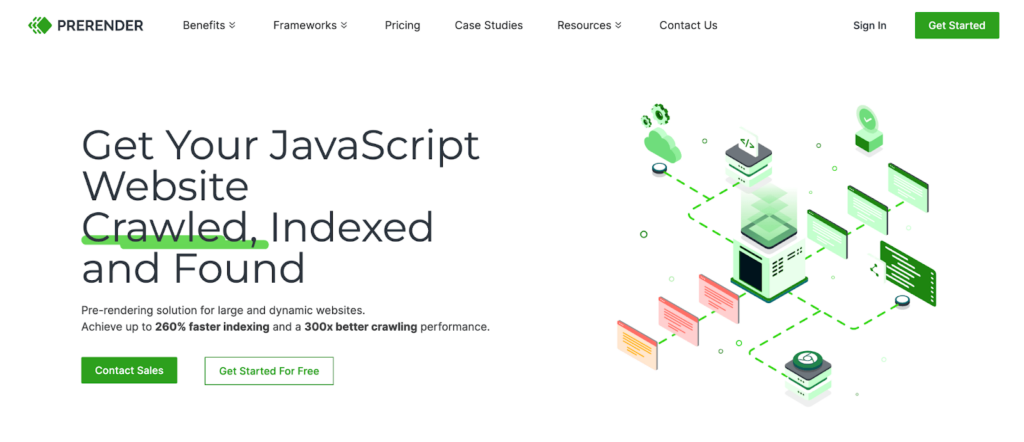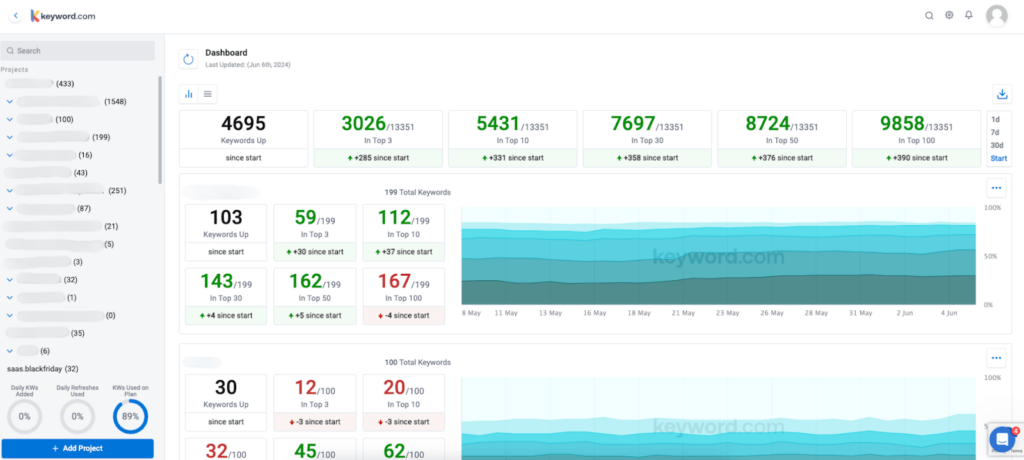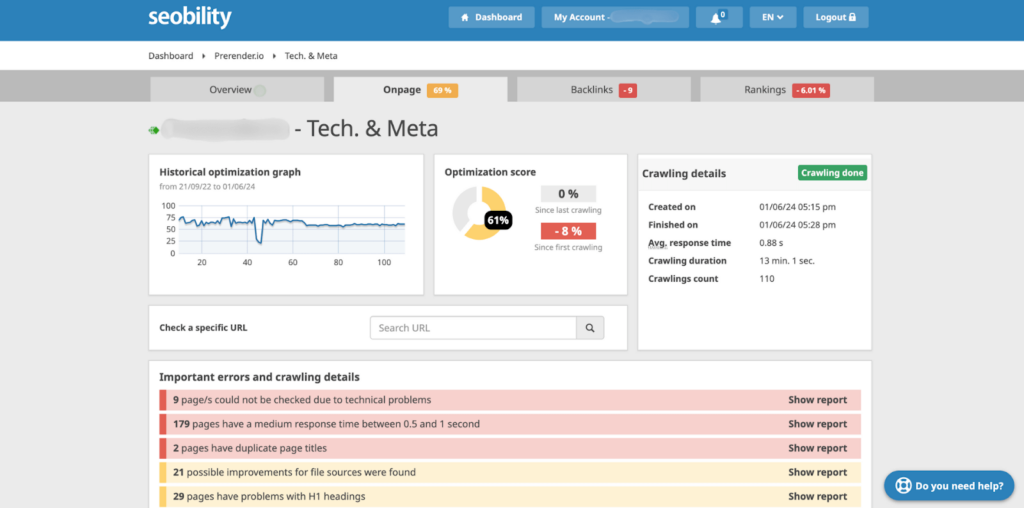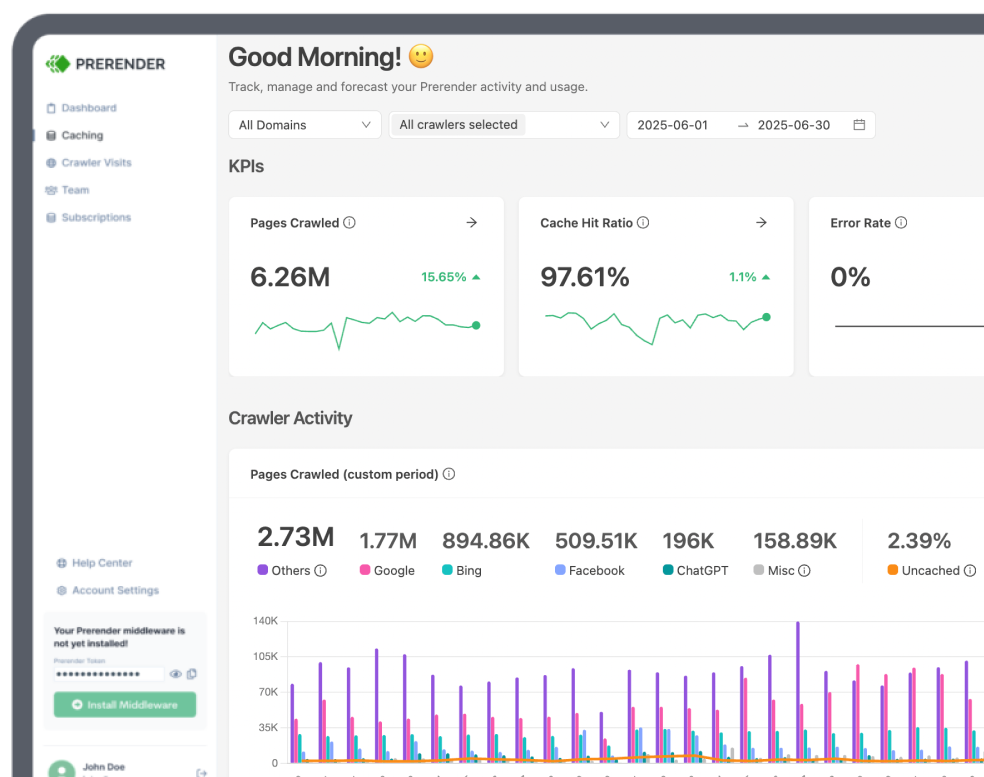When it comes to SEO optimization, most SEO managers treat desktop and mobile SEO the same. This isn’t the ideal approach, as Google now benchmarks website indexing and overall SEO performance through the eyes of mobile users.
To properly analyze the performance of your site’s mobile version, you need the right mobile SEO tools. In this blog, we’ll discuss 6 mobile SEO optimization tools that can help you pinpoint any mobile SEO issues and empower you to improve your SEO performance and user experience.
Mobile SEO: The Basics
Before we go straight to the recommended mobile SEO tools, it’s important to understand why mobile SEO matters, especially for ecommerce websites, and how it differs from desktop-based SEO.
Mobile SEO vs. Desktop-Based SEO
As the name suggests, mobile SEO refers to the user experience when navigating your mobile website. Generally, the on-site SEO of mobile SEO is very similar to the desktop-based SEO. However, the technical SEO of mobile SEO is slightly different and more challenging.
Keep in mind that mobile users are accessing your website through smaller screens and often unstable or low-speed internet connections. This means that for mobile SEO, you need to pay attention to some extra SEO elements that aren’t that important for desktop-based SEO. This includes:
- Mobile website design: can mobile users easily read and click a button?
- Page load speed: how fast does it load? Are some of the web page elements disappearing?
For ecommerce SEO, the number of mobile shoppers is increasing each year—making the stake in optimizing mobile SEO for a better mobile shopping experience higher than before. Shoppers must be comfortable browsing, selecting, and purchasing your ecommerce products, even if they are shopping on the go.
How Mobile-First Indexing Impacts Mobile SEO
Ever since Google rolled out mobile-first indexing in 2016, it has prioritized the mobile version of any website for indexing and ranking in SERPs. This means a slow, unresponsive mobile experience can hinder your site’s visibility and traffic.
We’ve comprehensively discussed Google’s mobile-first indexing and how to optimize your site to meet Google’s mobile site standards here.
Top Mobile SEO Tools to Improve Your SEO Performance
Now you know where to focus when optimizing your mobile SEO, let’s find out some recommended mobile SEO tools that can help you achieve your SEO goals.
1. Prerender: Best Mobile SEO Tool to Improve JavaScript Mobile Friendliness

Google struggles to efficiently crawl and index JavaScript-heavy pages, especially on mobile devices with limited processing power. This results in slow loading times, incomplete indexing, and a frustrating experience for your users. This is especially bad for ecommerce websites, as users are likely to buy from your competitor if they see your mobile website is inaccurate or laggy.
Prerender’s JavaScript pre-rendering solution tackles this issue head-on, working for both desktop and mobile pages. By rendering your pages beforehand (or on the fly), Prerender lightens the load for Googlebot when it crawls your site. Additionally, Prerender caches these pre-rendered pages, leading to two key benefits:
- Faster and more accurate indexing: Google can readily access any updates you make to your product pages, ensuring accurate search results.
- Blazing-fast page serving time (0.03 seconds average): mobile shoppers experience smooth and speedy page loads, significantly improving their shopping experience.
Learn more about the JavaScript complex indexing process and how Prerender can help increase your indexing performance by 260%.
2. Google PageSpeed Insights: Best Mobile SEO Tool for Analyzing Website Speed

Google PageSpeed Insights is a free tool for measuring your website’s mobile and desktop performance. If you have a 90 or above score (maximum 100), your website is considered well-optimized. If you score below 50, your ecommerce site has significant mobile performance issues, which could negatively impact user experience and rankings.
Pro Tip: How to Improve Your Google Pagespeed Insights Score to 100 Points
Here’s a breakdown of what Google PageSpeed can do:
- Speed analysis: measure various speed metrics, such as FCP (how long it takes for the first content piece to show up on screen), TTI (how long it takes for the page to become fully interactive), and TBT (how long the page is unresponsive to user interactions due to heavy tasks).
- Core Web Vitals evaluation: analyze key metrics related to your retail site’s loading, interactivity, and visual stability. This guide explains more about the roles of Core Web Vitals and how to improve them.
- Recommended solutions: suggest practical strategies to improve page speed and overall site performance, such as reducing image sizes and leveraging browser caching.
Did you know that Prerender can reduce your Server Response Time (SRT), a factor in Google PageSpeed, to 50 milliseconds?
Take Haarshop, a Dutch online store, as a prime example. After implementing Prerender, they achieved a remarkable 99 PageSpeed score, followed by a surge of 50% in organic traffic! Curious to see the process? Read their success story here.

3. Google Search Console: Best Mobile SEO Tool for Monitoring Indexing Performance

Google Search Console is more than an SEO tool to analyze your website’s clicks, impressions, or CTR results. It can also show other aspects of your website’s health, especially those related to the mobile shopping experience and indexing performance. Some of the key functions are:
- Mobile-friendly test: test specific pages to ensure they meet Google’s mobile-friendly criteria for page design and website functionality. T.
- Index coverage and crawl report: discover which of your submitted URLs have been indexed by Google and identify roadblocks that hinder it, such as missing pages (404 errors), website malfunctions (server errors), and inaccessible resources.
- Robots.txt editor: choose whether to allow or disallow search engines to crawl and index specific pages of your ecommerce store to save your limited crawl budget.
- Sitemap submission: help Google crawl all the important pages of your online store effectively by submitting your sitemap.
4. Screaming Frog: Best Mobile SEO Tool for Technical SEO Auditing

Known for its comprehensive site auditing capabilities, Screaming Frog is next on our best SEO tool list for improving the mobile shopping experience. Its powerful spiders can crawl large websites hosting hundreds of thousands of URLs, making it a fitting solution for ecommerce sites.
Screaming Frog offers a vast range of SEO analysis options, ranging from on-page elements (metadata and headings) to technical SEO elements (links and XML sitemaps). Here are the most important areas to focus on if you want to enhance your mobile user experience:
- Broken links and redirects: discover redirects, broken links, and server error issues (4xx client and 5xx server errors) to provide a smooth shopping experience for your customers).
- Image optimization: identify large images that slow the mobile page loading speed.
- Sitemap analysis: check your sitemap to ensure it includes all your mobile pages. This will increase the chances of your content appearing on SERPs.
Not a fan of Screaming Frog? Try these ten alternative tools to Screaming Frog.
5. Keyword.com: Best Mobile SEO Tool for Local SERPs Tracking

If you’re targeting customers in a specific location, you’ll need a local rank tracker like Keyword.com. It will help you track how your ecommerce store ranks for location-specific keywords like “buy mountain bike near me” or “mountain bike Seattle.”
Monitoring your keyword performance allows you to tailor your product descriptions and metadata to align with local search intent. This helps your ecommerce store appear higher in search results for local mobile searches, making it more likely for potential customers searching for products near them to find you.
Here are some key features of Keyword.com that can improve your SEO keyword strategy:
- Cross-device rank tracking: find out the keyword performance coming from mobile and desktop traffic.
- Share of voice: see the SERP history of your targeted keywords across different segments to discover who you are really competing against.
- Keyword suggestions: get daily updates on keywords you’re ranking for but not tracking.
6. Seobility: Best Mobile SEO Tool for On-Page SEO Auditing Tool

The last SEO tool to enhance your mobile shopping experience is Seobility. This multi-faceted SEO solution shines brightest for mobile optimization through its on-page auditing capabilities.
Since mobile shoppers are less likely to scroll endlessly through search results, Seobility helps you optimize your product pages for the top SERP positions. Consequently, your ecommerce website will be more likely to attract mobile shoppers to click and buy.
Some on-page elements that Seoblity analyzes are:
- Meta tags and page attributions: flags missing, duplicate, or poorly optimized titles and descriptions.
- Page structure: identifies issues with headings and oversized files.
- URL details: checks URL parameters quality, URL session IDs, and the number of subdirectories.
Level Up Your Mobile SEO Performance with The Right Mobile SEO Tools
A smooth, fast, and user-friendly mobile shopping experience isn’t just about customer satisfaction; it also sends a powerful message to Google. When you prioritize mobile optimization, you make it easier for Google to find and understand your products, potentially leading to better visibility in search results.
Use Prerender to tackle the notoriously poor crawling and indexing performance of large-scale JavaScript websites like ecommerce stores. Our plug-and-play solution requires no upfront investment and minimal development time. We have helped countless ecommerce sites ensure their web pages are quickly indexed by Google, making them easily discoverable by potential customers on SERPs.
Head over to our website to learn more about how Prerender can transform your mobile SEO and see success stories from happy clients. Once you’re ready to take the plunge, visit our pricing page to choose the best plan for your ecommerce needs.
FAQs – Best Mobile SEO Software
Answering some common questions about mobile SEO, its optimization tips, and recommended tools to improve your mobile SEO scores.
1. Can I Use Any SEO Tool to Improve My Mobile SEO Performance?
Generally, SEO tools are designed to help you analyze and improve the SEO performance of your website, including your mobile SEO. That said, you need to know what metrics to focus on if you want to optimize your mobile SEO health, as some SEO metrics and elements are more important for mobile SEO than desktop-based SEO.
2. I Want to Increase the PageSpeed Score of My Mobile Site. What Can I Do?
The first step to improve your mobile site’s PageSpeed score is to analyze what’s causing the slow page performance. If your site is JavaScript-heavy, minify the JS files, remove unused CSS, and reduce the media file size. We also recommend adopting Prerender.io, which can reduce your SRT to under 50 milliseconds. Learn the details here.
3. How Can I Make My Website Mobile-Friendly?
Here are some tips to make your website mobile-friendly:
- Choose a responsive and minimalist mobile website layout
- Avoid intrusive pop-ups, such as pop-up windows and messages
- Verify that all buttons are easily clickable, appropriately sized, and strategically positioned for intuitive interaction
Head out to our ‘Best Tips on How to Make a Website Mobile Friendly’ to learn more.



